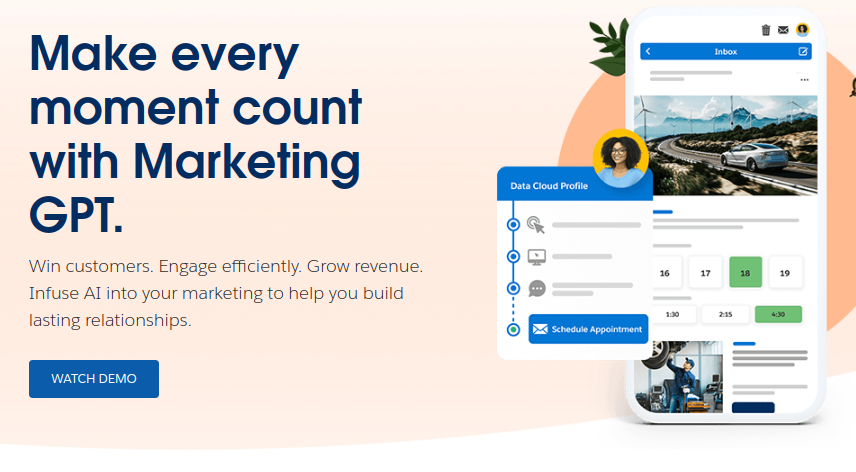 AI
AI
 AI
AI
 AI
AI
Salesforce Inc. said today it’s stepping up its generative artificial intelligence push with the launch of two new applications, Marketing GPT and Commerce GPT.
The former is aimed at helping marketers to generate personalized emails and create smarter marketing journeys, while the latter is designed to help companies create more personalized shopping experiences and customized recommendations.
The new offerings came as Salesforce announced it’s expanding its strategic partnership with Google Cloud with a pair of new integrations designed to help companies leverage AI. The goal is to provide a better understanding of their customers’ behavior, create personalized experiences and run more effective marketing campaigns.
Salesforce has been pushing generative AI hard this year, determined to capitalize on one of the hottest trends in technology today. Last week, Salesforce Chief Executive Marc Benioff said the company intends to lead the next major revolution in customer relationship management by integrating generative AI into the vast majority of its applications and services, and it has wasted little time in making good on that promise.
The new Marketing GPT service will be able to assist marketers with multiple tasks, Salesforce said, thanks to a bunch of capabilities it will deliver. For instance, its Segment Creation feature, available in pilot this summer, will help marketers to quickly create audience segments and improve targeting with natural language prompts and AI-powered recommendations.
Email Content Creation, available in pilot in October, will enable users to auto-generate personalized emails to improve customer engagement. Segment Intelligence for Data Cloud will automatically connect first-party data, revenue data and third-party paid media data to deliver a more comprehensive view of audience engagement.
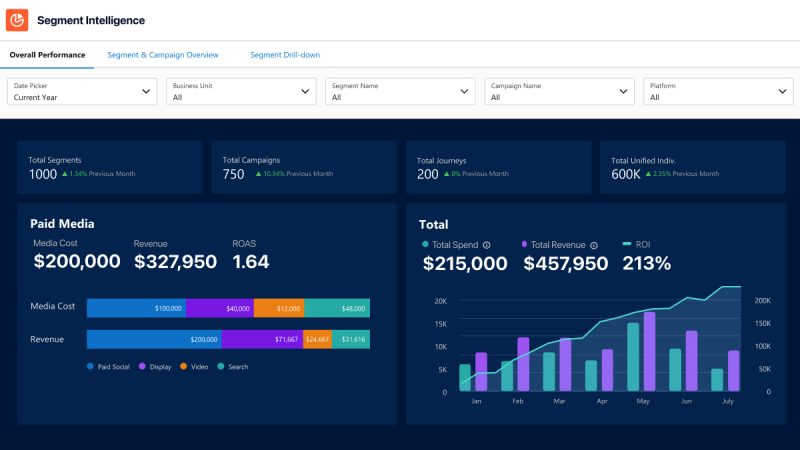
Other capabilities within Marketing GPT include Rapid Identity Resolution, Segmentation and Engagement, which automatically identifies customers and refreshes segments in Salesforce Data Cloud, and Typeface, which can be used to create contextual visual assets for marketing campaigns.
Meanwhile, Commerce GPT will help to automate growth with Goals Based Commerce, a new tool that will enable businesses to set targets and goals then generate actionable insights and recommendations on how to achieve them. Dynamic Product Descriptions will assist by automatically filling in missing catalog data for merchants, with auto-generated product descriptions tailored to specific buyers. Finally, Commerce Concierge will power personalized conversations with shoppers and help them to discover new products through natural language interactions within digital storefronts and messaging applications.
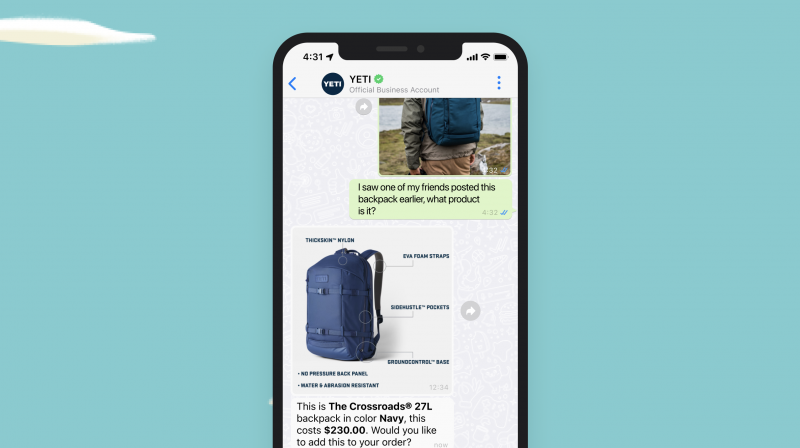
Although much of the chatter will inevitably be around the content generation capabilities of Salesforce’s newest offerings, the audience segmentation functionality is likely to have the most positive impact for marketers, Liz Miller, vice president and principal analyst of Constellation Research Inc., told SiliconANGLE.
“The big opportunity here lies in how AI is being applied to data, and specifically in the audience and customer data segments,” Miller explained. “Marketers can literally ask about different segments and explore new opportunities that could be really important and profitable for businesses.”
Miller added that Segment Intelligence for Data Cloud is also a nice addition, since it brings first and third party data together with critical information about revenue. “This promises to bring more refined business context to engagement, and insights into how those experiences impact the bottom line,” she said.
Salesforce Chief Product Officer David Schmaier said businesses are determined to harness the latest advances in AI to deliver more personalized customer experience. Marketing GPT and Commerce GPT will revolutionize how businesses interact with customers and at the same time dramatically improve employee productivity,” he said.
Salesforce is also moving the needle in other areas through its partnership with Google Cloud. It has resulted in a pair of new integrations that will enable businesses to use their data with custom AI models, so they can better predict customer’s needs while reducing the cost, risk and complexity of synchronizing data across platforms.
The first integration between Salesforce Data Cloud and Google BigQuery will help companies to create unified profiles of their customers, using data from across platforms and clouds, and deliver highly personalized experiences based on them. Companies will be able to access customer data from a single location, without needing to extract, transform and load that data first.
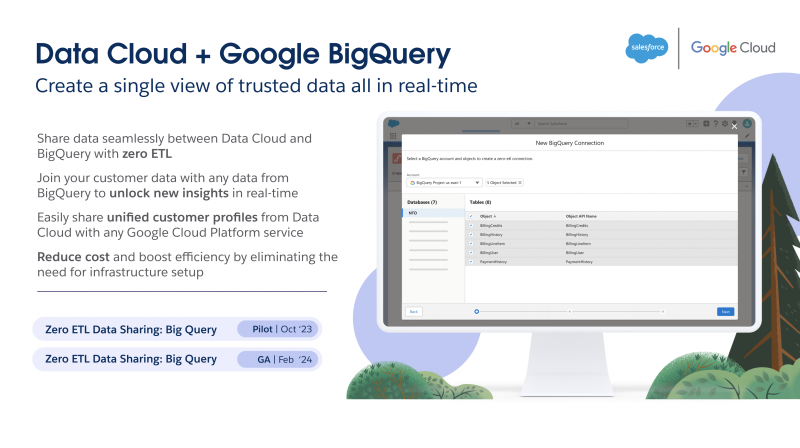
Meanwhile, the integration between Salesforce Data Cloud and Google Vertex AI makes it possible to create customized AI models in Vertex AI and use them across Salesforce’s CRM platform, without moving data. In this way, it simplifies the process of creating and training models to predict buyer behavior, customer churn and more, Salesforce said.
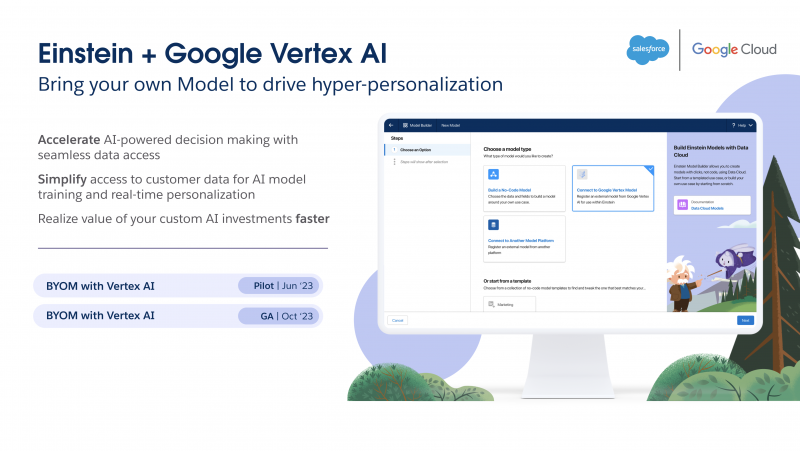
Salesforce said the two integrations will enable a fashion retailer to connect CRM data such as a customer’s purchase history and service interactions with non-CRM data such as social media sentiment and real-time online activity. They will then be able to deploy custom AI models that can predict their likelihood of buying certain types of clothing, based on that mix of data. Using this, they can then deliver personalized recommendations to that customer.
Alternatively, a healthcare provider can connect CRM data such as appointment history and patient feedback with non-CRM data such as patient demographics and use it to train models that predict which patients are at risk of readmission. Then, they can create personalized care plans for their most at-risk patients, in order to deliver proactive care.
Holger Mueller of Constellation Research said the announcements are a positive development for enterprises, since they’re always looking for simple and cost effective ways to integrate data that lives across different clouds. “It will help developers to build more advanced and sophisticated applications that are desperately needed in this era of digital transformation,” he said. “Salesforce’s strengthening partnership with Google Cloud is most of all a win for customers, who will reap the benefits.”
Salesforce Data Cloud’s integration with BigQuery will be available in pilot in late-2023, while the integration with Vertex AI will become available in mid-2023, Salesforce said.
“Together, Salesforce and Google are empowering organizations to unlock the full potential of their trusted data, put AI insights into action, and personalize customer experiences like never before,” Schmaier said.
Support our open free content by sharing and engaging with our content and community.
Where Technology Leaders Connect, Share Intelligence & Create Opportunities
SiliconANGLE Media is a recognized leader in digital media innovation serving innovative audiences and brands, bringing together cutting-edge technology, influential content, strategic insights and real-time audience engagement. As the parent company of SiliconANGLE, theCUBE Network, theCUBE Research, CUBE365, theCUBE AI and theCUBE SuperStudios — such as those established in Silicon Valley and the New York Stock Exchange (NYSE) — SiliconANGLE Media operates at the intersection of media, technology, and AI. .
Founded by tech visionaries John Furrier and Dave Vellante, SiliconANGLE Media has built a powerful ecosystem of industry-leading digital media brands, with a reach of 15+ million elite tech professionals. The company’s new, proprietary theCUBE AI Video cloud is breaking ground in audience interaction, leveraging theCUBEai.com neural network to help technology companies make data-driven decisions and stay at the forefront of industry conversations.